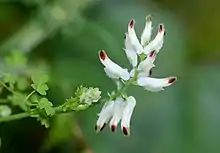Fumaria capreolata
Fumaria capreolata, the white ramping fumitory,[2] is an herbaceous annual plant in the poppy family Papaveraceae. It is native to Europe, western Asia and northern Africa and naturalised in southern Australia, New Zealand, and southern South America.[3][4] Common names include climbing fumitory, ramping fumitory, white fumitory, white ramping fumitory and white-flower fumitory.[3]
| Fumaria capreolata | |
|---|---|
 | |
| Scientific classification | |
| Kingdom: | Plantae |
| Clade: | Tracheophytes |
| Clade: | Angiosperms |
| Clade: | Eudicots |
| Order: | Ranunculales |
| Family: | Papaveraceae |
| Genus: | Fumaria |
| Species: | F. capreolata |
| Binomial name | |
| Fumaria capreolata | |
| Synonyms | |
|
Fumaria officinalis L. var. capreolata (L.) Ewart | |
Description
Plants have stems to 1 metre long and sometimes climb. The leaves are pinnatisect. Inflorescences comprise up to 20 purple-tipped white to cream flowers that appear in spring and summer. These gradually become pink after pollination.[5]
Unlike other Fumaria species which are known as weeds of crops and agricultural areas, Fumaria capreolata can become naturalised in areas of natural vegetation and smother low-growing plants, becoming an environmental weed.[6]
References
- "Fumaria capreolata". Australian Plant Name Index (APNI), IBIS database. Centre for Plant Biodiversity Research, Australian Government, Canberra. Retrieved 8 January 2013.
- "Fumaria capreolata". Natural Resources Conservation Service PLANTS Database. USDA. Retrieved 19 January 2016.
- "Fumaria capreolata". Germplasm Resources Information Network (GRIN). Agricultural Research Service (ARS), United States Department of Agriculture (USDA). Retrieved 8 January 2013.
- GBIF: Fumaria capreolata occurrence data. Global Biodiversity Information Facility. Retrieved 27 August 2018.
- "Fumaria capreolata L." PlantNET - New South Wales Flora Online. Royal Botanic Gardens & Domain Trust, Sydney Australia. Retrieved 8 January 2013.
- "Climbing fumitory Fumaria capreolata – Weeds of Australia Biosecurity Queensland Edition". Queensland Government. Retrieved 8 January 2013.
External links
- GBIF: Fumaria capreolata occurrence data map & photos. Global Biodiversity Information Facility. Retrieved 27 August 2018.
- Weeds of Australia identification tool: Factsheet - Fumaria capreolata. Queensland Government.
| Wikimedia Commons has media related to Fumaria capreolata. |